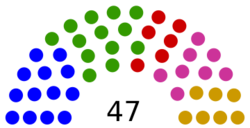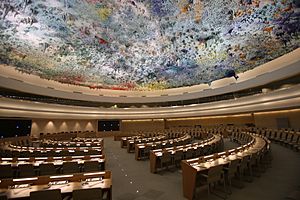United Nations Human Rights Council facts for kids
Quick facts for kids United Nations Human Rights Council |
|
|---|---|

|
|
| History | |
| Founded | 15 March 2006 |
| Leadership | |
|
President
|
|
| Structure | |
| Seats |
African States (13)
Asia-Pacific States (13)
Eastern European States (6)
Latin American and Caribbean States (8)
Western European and Other States (7)
|
 |
|
| Meeting place | |
 |
|
| The Human Rights and Alliance of Civilizations Room is the meeting room of the United Nations Human Rights Council, in the Palace of Nations in Geneva, Switzerland | |
| Website | |
| HRC at the ohchr.org | |
The United Nations Human Rights Council (UNHRC) is a special group within the United Nations. Its main job is to help and protect human rights for people all over the world. Human rights are basic rights and freedoms that belong to every person, like the right to be safe and to speak freely.
The Council has 47 member countries. These members are elected for three-year terms. The Council's main office is in Geneva, Switzerland. It looks into situations where human rights might be violated in United Nations member states. It also focuses on important topics like freedom of expression, women's rights, and the rights of minority groups.
The UNHRC was created by the United Nations General Assembly on March 15, 2006. It replaced an older group called the United Nations Commission on Human Rights. The Council has faced criticism for sometimes including member countries that have been accused of not protecting human rights themselves.
What is the Council's Structure?
The members of the UN General Assembly vote to choose the 47 countries that sit on the Human Rights Council. Each country serves for three years. A country can only serve for two terms in a row before it has to take a break.
The 47 seats are divided among different regions of the world to make sure it's fair:
- 13 seats for African countries
- 13 seats for Asia-Pacific countries
- 6 seats for Eastern European countries
- 8 seats for Latin American and Caribbean countries
- 7 seats for Western European and other countries (like the USA, Canada, and Australia)
How Often Does the Council Meet?
The UNHRC has regular meetings three times a year: in March, June, and September. If there is an emergency or a serious human rights problem, the Council can hold a special session. This can happen at any time if at least one-third of the member countries agree.
Who Are the Current Members?
The members of the Council change regularly. Here is a list of the countries that are currently members, based on when their term ends.
| Term | Asia-Pacific States (13) | African States (13) | Eastern European States (6) |
Latin American & Caribbean States (8) |
Western European & Other States (7) |
|---|---|---|---|---|---|
| 2025–2027 |
|||||
| 2024–2026 |
|||||
| 2023–2025 |
Who Leads the Council?
The Council has a President who is chosen each year. The President helps lead the meetings and guide the Council's work. Here are some of the recent Presidents.
| No. | Name | Country | Time |
|---|---|---|---|
| 19 | Jürg Lauber | 1 January 2025 – Incumbent | |
| 18 | Omar Zniber | 10 January 2024 – 31 December 2024 | |
| 17 | Václav Bálek [] | 1 January 2023 – 31 December 2023 | |
| 16 | Federico Villegas | 1 January 2022 – 31 December 2022 | |
| 15 | Nazahat Shameen Khan | 1 January 2021 – 31 December 2021 | |
| 14 | Elisabeth Tichy-Fisslberger | 1 January 2020 – 31 December 2020 | |
| 13 | Coly Seck | 1 January 2019 – 31 December 2019 |
Can a Member Be Suspended?
Yes, the UN General Assembly can suspend a Council member. This happens if a country is found to have committed serious and repeated human rights violations. A two-thirds vote is needed for a suspension.
For example, Libya was suspended in 2011 during a period of conflict in the country. In 2022, Russia was suspended from the Council after its invasion of Ukraine. Russia was the first permanent member of the UN Security Council to be suspended from any UN body.
How Does the Council Do Its Work?
The Council has several ways to check on human rights around the world. These are called its procedures and mechanisms.
Universal Periodic Review (UPR)
One of the most important jobs of the Council is the Universal Periodic Review (UPR). This is like a report card for every single one of the 193 UN member countries. Each country's human rights situation is reviewed every four to five years.
During the review, the country gets feedback from other countries and from groups like non-governmental organizations (NGOs). The goal is to help countries improve their human rights records.
Special Procedures
The Council uses "special procedures" to get advice from experts on human rights. These experts are called "special rapporteurs" or "independent experts." They are not paid for their work, which helps them stay independent.
These experts focus on two main areas:
- Thematic mandates: They look at major human rights issues that happen all over the world, like the right to clean water or the right to education.
- Country mandates: They report on the human rights situation in a specific country or territory.
These experts investigate problems, give advice, and report their findings to the Council.
Complaint Procedure
Anyone can report serious and reliable patterns of human rights violations to the Council. This is done through a confidential complaint procedure.
A group of experts reviews these complaints. If they think a complaint is serious, they will investigate it further. They may ask the country involved for more information. This process is meant to help victims and find solutions to human rights problems.
What Issues Does the Council Focus On?
The Council deals with many human rights issues around the world. Some situations get more attention than others, which sometimes leads to debate.
Israel and Palestine
The Council has paid a lot of attention to the human rights situation in the Palestinian territories. It created a permanent agenda item, known as Agenda Item 7, to discuss this issue at every session. This means the situation is reviewed more often than in any other country.
The Council has a Special Rapporteur who investigates human rights in the area. Some countries, like the United States, have criticized the Council for what they see as an unfair focus on Israel. They argue that other countries with serious human rights problems do not get the same level of attention.
In 2009, the Council created a mission, led by Judge Richard Goldstone, to investigate the Gaza War. The report found evidence that both sides had committed serious violations of international law.
Other Country Situations
The Council also looks at human rights in many other countries.
- Myanmar: In 2018, a UNHRC report said that top military leaders in Myanmar should be investigated for very serious crimes against the Rohingya Muslim minority.
- Yemen: A 2019 report for the Council stated that the United Arab Emirates and Saudi Arabia may have committed serious violations during the war in Yemen.
- Iran: In 2022, the Council held a special session to discuss the human rights situation in Iran, especially concerning women and children.
- Ukraine: After Russia's invasion in 2022, the Council created a commission to investigate human rights violations during the conflict.
Controversies and Criticisms
The UNHRC is often at the center of debate and has faced a lot of criticism.
Membership Issues
One of the biggest criticisms is that countries with poor human rights records are sometimes elected as members. Critics say this hurts the Council's credibility. For example, countries like China, Saudi Arabia, and Venezuela have been elected to the Council, even though they have been accused of human rights abuses.
In 2015, the ambassador from Saudi Arabia was chosen to lead an important panel of experts. This caused an outcry from human rights groups, who pointed out Saudi Arabia's own human rights record.
Accusations of Bias
As mentioned before, the Council is often accused of being biased against Israel. Former UN Secretaries-General Kofi Annan and Ban Ki-moon both expressed concern about the Council's disproportionate focus on Israel.
The United States has had a changing relationship with the Council. The U.S. did not join the Council when it was first created. Later, under President Barack Obama, the U.S. joined and became an active member. In 2018, under President Donald Trump, the U.S. withdrew from the Council, citing its bias against Israel and other problems. In 2021, the U.S. decided to re-engage with the Council under President Joe Biden. On February 4, 2025, President Trump again withdrew the U.S. from the Council.
Despite the criticisms, many see the UNHRC as a vital tool for shining a light on human rights abuses and holding countries accountable.
See also
 In Spanish: Consejo de Derechos Humanos de las Naciones Unidas para niños
In Spanish: Consejo de Derechos Humanos de las Naciones Unidas para niños
- Community of Democracies
- Human rights in cyberspace
- United Nations Guiding Principles on Business and Human Rights
- UN Watch
- Vienna Declaration and Programme of Action
 | John T. Biggers |
 | Thomas Blackshear |
 | Mark Bradford |
 | Beverly Buchanan |


